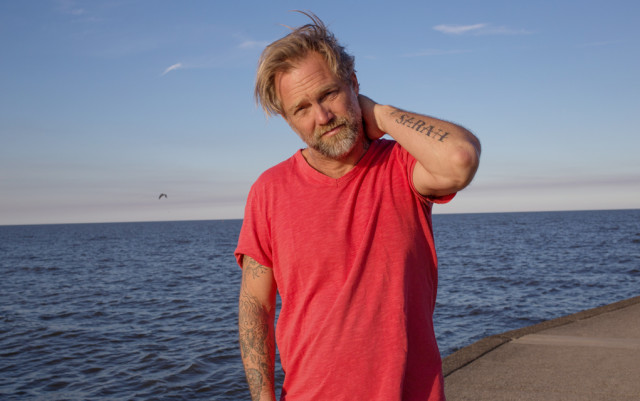
It was mid afternoon on Good Friday here and in Dallas, Texas when we caught up to Anders Osborne on tour, hangin’ out behind the Gas Monkey and marking the Christian holy day with a little personal ceremony of his own, somewhat sideways to The Passion.
“Yeah, I’m sitting by a little pond, just meditating. I just finished 30 minutes of ringing my Tibetan bells and my little bowl, and listening to the birds.”
It’s a moment of pre-sound-check peace for one of New Orleans’ most celebrated hell-raisers, but not entirely out of character these days for the guitarist/songwriter. A run through Osborne’s latest record, last month’s Spacedust & Ocean Views, finds the guitarist in a (largely) reflective mood, an extended meditation on place and moments in time, memory, passages through and exits from paragraphs in the non-fiction docudrama of life.
Through languid, gently formed figures, Osborne coaxes odes of gratitude and compelling imagery in what seems a little like a travelogue — like watching his kid chasing seabirds on the beach in “Cape Cod,” trying to fly himself. He celebrates the Delta gestalt in the album’s feature single “Lafayette,” a love letter to The Lake. He ponders the smallness of everything as seen from space (seriously) in a quirky closing spoken-word thing called “From Space.” And he’s menacing as an angry Baptist preacher gone bad, going back to Mississippi on “Move Back,” but we’ll get to that in a moment.
This whole record felt to us, we tell Osborne, like a great exhale.
“No, that’s a very astute observation,” Osborne says. “For me, I likened it to the end of the day, or a sunset. It felt like the end of something… slightly exhausting. But ‘exhale’, that may even be better analogy for it.
“I don’t know. A lot of stuff … after years of living, now I feel like I’m in a different phase of my life, like I want to start something fresh. Whatever that means. The way I approach my career, my family life and my own health, stuff like that. It’s reflected in the music, and I think this is the beginning of that.
“Not that I’m going to change styles or do something completely different. I can only do what I do.”
It sounds, in places, like something approaching contentment, something like a happy ending — or middle, depending on what comes next — for a guy who led a famously hard-charging, hard-partying, loose-cannon lifestyle as a juke-torchin’ blues guitarist in New Orleans in his younger days.
And still, there are loose ends. “Burning out slowly/not catching on fire/try to be the flame/But my body’s so tired … people and places/feelings and goals/monuments I have to see/Weddings and birthdays/dying alone /tell me, tell me, tell me/what does it mean?” Osborne pleads on “Burning,” maybe the album’s most lyrically arresting confessional.
Loose ends, doubts?
Osborne pauses… a long time.
“There’s an old saying, I’m not sure which culture it comes from, maybe Zen Buddhism, ‘One can never know one’s self.’ It’s an impossibility, an oxymoron. The fingertip cannot feel itself, the eye cannot see itself. You can never truly know who you are, only other people can see you for what you really are.”
It’s the rabbit on the greyhound track. No matter how fast you go, it’s always one stride ahead.
Osborne cracks up.
“That’s it! Yeah, it’s very frustrating.”
And what about the grinding, pitiless swamp blues number “Move Back?” Fans of Osborne accustomed to his serrated and molten blues guitar playing will recognize their guy here. It hits the album eight cuts in like a tire iron in a meringue pie. Go back to Mississippi. Why?
“I felt like the song fit. I did 30 or 35 tracks during this session; I was going to make a double LP out of it. But I felt like the rocking parts didn’t quite fit with these 10 or 11 tunes that all seemed to be thematically joined. I put them all together, but I thought that the story of the move back to Mississippi — it felt like a necessary song, that it needed to be part of this little discussion.
“This is a song about people who come sometimes from New Orleans, but also from outside New Orleans, and they move into the city. And they need to make money and move on with their lives. And I’ve seen it many, many times. These kids come in, and the city will swallow them up. They get influenced by the wrong groups of people, and before you know, they’re in trouble.”
But even if Osborne doesn’t have it all figured out, he still writes beautifully about wanting to. And as he approaches (in May) his 50th birthday, he’s feeling positive.
“I don’t know how much the number is making a difference, but I must say, the last year or so, something has changed. The way I feel physically, everything.
“But I think this is the decade I’m most excited about. I liked my 20s; I never thought about anything, I was always in the moment. That was cool. But now, I feel like I have a purposeful decade ahead of me.”
On the Bill: Anders Osborne. 7 p.m. Friday, April 8, Boulder Theater, 2032 14th St, Boulder, 303-786-7030














